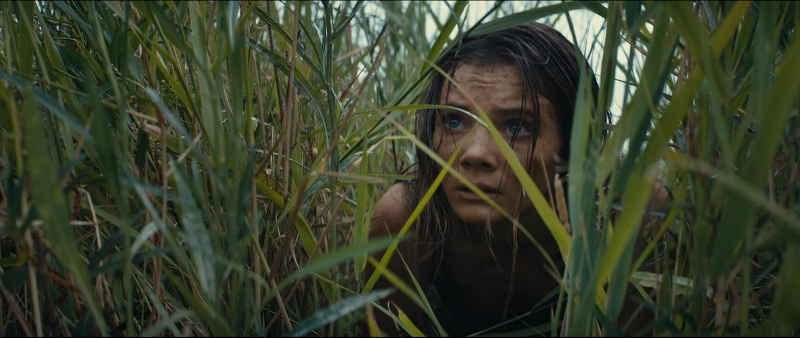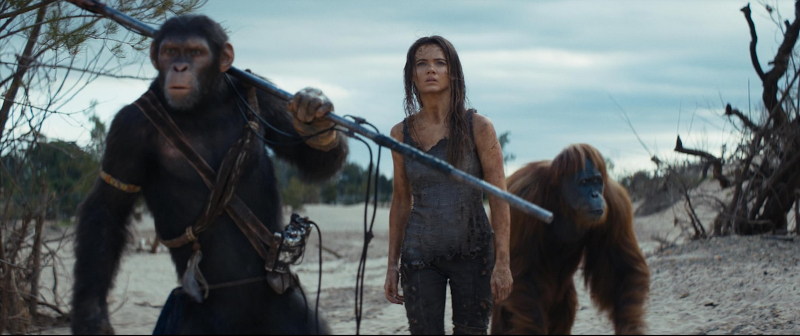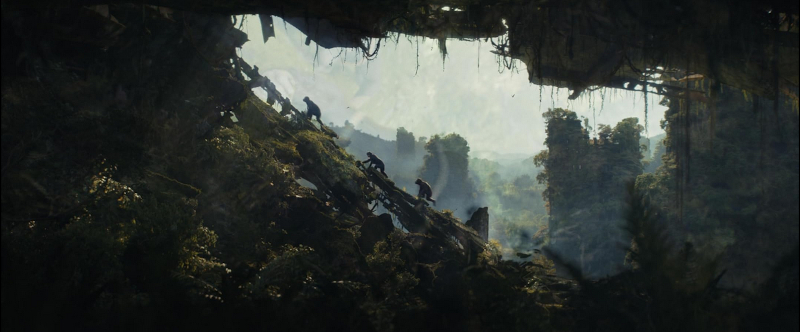Director – Wes Ball – 2024 – US – Cert. 12a – 145m
*****
The fourth entry in the current franchise reboot takes place several generations after the previous three films when apes live in scattered communities and humans have lost the power of speech – out in UK cinemas on Thursday, May 9th
Noa (Owen Teague) has deep-seated feelings of failure. His father is the head of the Eagle Clan, a tribe of chimps who live in symbiosis with trained eagles, and Noa thinks nothing of scaling the highest local rock face to steal his own eagle egg for later bird rearing. He goes on such quests with his two loyal friends, the male Anaya (Travis Jeffery) and the female Soona (Lydia Peckham). He also values the wisdom of Raka (Peter Macon), an orangutan with considerable knowledge of the generations-old teachings of Ceasar.
Noa spots a human girl (Freya Allan) sneaking around the village and environs. A short while later, all hell breaks loose as a cavalry of masked apes attack and burn the village. Noa resolves to leave the safety of the local valley and venture into the land beyond on horseback, accompanied by Raka. They soon realise the non-speaking girl is following on foot, and no sooner have they coax her into joining their quest than they run into first a herd of humans at a small forest pool, then the mounted masked gorillas from whom they must rescue the silent girl. They christen her Nora.

The trio’s journey cross-country continues until they find themselves in the fiefdom of the despotic chimp Proximus Caesar (Kevin Durand) who has set up shop in the remains of an old battleship next to an impregnable human stronghold he wants to breach in the hope for finding human technology and weaponry inside. Nora meets the despot’s human collaborator Trevathan (William H. Macy), who has been filling the ape’s head with tales of the old human-speaking world and its attendant technologies. Proximus wants her to tell him how to breach the stronghold; however, Nora has an agenda of her own…
Under the guiding hand of Rick Jaffa and Amanda Silver, the producers-writers responsible for successfully rebooting the Planet of the Apes franchise in 2014, this appears to be the first film in another trilogy based on that reboot. Having ditched the time travel element of the original Planet of the Apes (Franklin J. Schaffner, 1968) in favour of genetics monkey experiments and accompanying virus destroying man’s ability to speak of Rise of the Planet of the Apes (Rupert Wyatt, 2014), this is set unnumbered generations on Earth after the recent trilogy placing it closer to the 1968 film.

There are further riffs from the 1968 film here: a brief middle section on the main protagonists’ journey takes them through desert landscape and strange angular scarecrow-like constructs, complete with a reworking of Jerry Goldsmith’s appropriately unsettling and arresting, broken down jazz piano score that no other soundtrack composer on the franchise has ever quite matched. The central presence of a young human woman unable to speak and her hunting at one point by apes on horseback is a further throwback, with an unexplained sutured scar on her arm a reminder of human skull scars and ape-performed lobotomy. (The horseback human hunting was also exploited as an asset in brief futuristic flashbacks – you can do that with time travel – in Escape from the Planet of the Apes, Don Taylor, 1971).
Under the sure directorial touch of Wes Ball, the man behind bringing The Maze Runner franchise (1914, 1915, 1918) to the screen, Kingdom delivers an impressive set of environments, from the opening Eagle Clan village, all constructed towers and nearby tall trees and cliff faces, through woodland landscapes and watering hole where ape cavalry appear and attack humans, a lengthy bridge adorned with poles and nets over a lake, a ships’ graveyard containing the former humans weapons stronghold and, towards the end in a likely taster of what is to come in the next two films, an underground complex of human technology manned by surviving, speaking, scientist humans.

Although the figure of Proximus is essentially a warmonger in the franchise’s long tradition of militarism, most notable in antagonist humans in Dawn of the Planet of the Apes, 2014 and War for the Planet of the Apes (2014 and 2017, both Matt Reeves), the scientist humans at once promise a radical departure for the next two films (we shall see) and, very loosely, echo the mutant, subterranean humans of misguided sequel Beneath the Planet of the Apes (Ted Post, 1970). The new film has presented the franchise with a potential pitfall for subsequent entries here, but its steering by Jaffa and Silver has served it well so far, so one hopes that they will be able to help it successfully walk what will be an undeniably difficult tightrope.
If the current film feels open-ended, there remains much here to appreciate. Its opening and ending deploy apes working with trained golden eagles, which feels like a mixture of motion capture and (this next bit is guesswork, because nothing in the press handouts talks about it) real, live trained birds (which, if I’m correct, is a remarkable innovation). These sequences are undeniably impressive.

So, too, is the three chimps’ rock face climb in search of eagle eggs at the start, particularly when Noa starts inserting a pole in a section of seemingly unclimbable rock face in order to access an unreachable eagle nest.
However, these opening sequences are by no means showstoppers; equally arresting sequences occur later on – the siege of the Eagle Clan village, the hunting of humans by ape cavalry, the fight on the bridge with treacherous, fast moving waters below, a vast room where a literate human lives with a library of old books, a labyrinth harbouring human tech and weapons, and more.
The characterisation never takes second place to all this, though. At its core, the narrative concerns three characters travelling across country and learning things about themselves and each other. Much horse riding through background landscape frequently lends the piece the feeling of a Western. There are also some surprises in store, particularly in terms of the human girl character, about which I don’t want to say too much for reason of spoilers, but it could be argued that her plight and position within the narrative is a metaphor for a woman doing what she must to survive in a man’s world.

Despite his having long since passed (the film opens with his funeral before leaping forward unnumbered generations), much is made of former ape leader Ceasar from the previous three films (in which he was played by Andy Serkis, who worked on the current film advising the actors on performance within the MoCap process, an area in which he and New Zealand’s Weta FX effects facility – who also worked on all four films in the franchise, not to mention Peter Jackson’s The Lord of the Rings trilogy / 2001-3 and King Kong / 2005 – have together developed considerable expertise).
Ceasar is now a quasi-religious figure, an essentially peaceful type pushed into a figure of armed military resistance in the three earlier reboot films. His followers (well, follower) now wear a pendant based on the attic window in Ceasar’s human foster home in Rise of the Planet of the Apes, a succinct and effective, graphic device to communicate his values carrying with it a raft of irony, given that it represents a human, not an ape, environment and a peculiar riff on religion’s (specifically Christianity’s) relationship to the oppressive Ceasars of the Roman Empire. The circular window-frame pendant, after all, fulfils a similar function to the crucifix similarly worn as a pendant by many Christians; like the cross or crucifix, it appears in different graphic manifestations in the course of the film’s visuals.
There is probably a great deal more to be said about all this, or to be explored and discovered in further viewings of this unexpectedly rich and strange film. There’s also a lot in here that recalls the 1968 original, so much so that the viewing experience of this one made me want to go back and rewatch that film.
In short, this fourth Apes reboot proves both highly satisfying in itself and at the same time provides considerable potential for further franchise entries.
Kingdom of the Planet of the Apes is out in cinemas in the UK on Thursday, May 9th.
Trailer:
